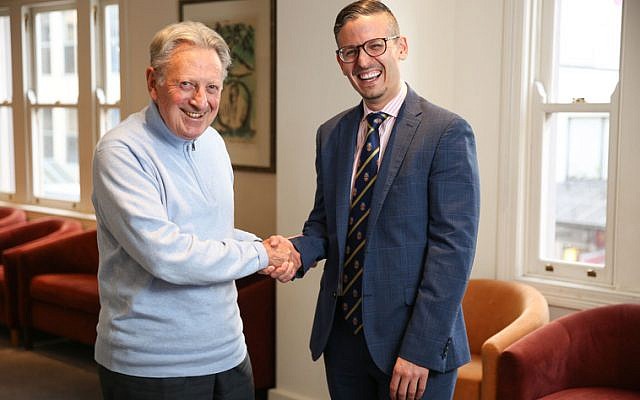Docs reunite after robotic surgery
TWO Jewish doctors in Sydney enjoyed a most heartfelt reunion late last month, just weeks after one of them was the other's patient in a new type of life-saving surgery called a robotic coronary artery bypass graft (RCABG).

TWO Jewish doctors in Sydney enjoyed a most heartfelt reunion late last month, just weeks after one of them was the other’s patient in a new type of life-saving surgery called a robotic coronary artery bypass graft (RCABG).
When Bondi Junction GP Dr Harry Johnson, 75, experienced chest pain, an analysis from an angiogram revealed a blockage, and he was advised he’d need open heart surgery.
He then picked up the phone and called Dr Levi Bassin.
“I’d previously worked with him [Dr Bassin] in my GP rooms, when he was a medical student quite some years ago,” Dr Johnson told The AJN.
That proved to be a wise move, as Dr Bassin happens to be one of only three surgeons in Australia who currently offer RCABG surgery – a procedure that uses the latest robotic medical technology to avoid the need to cut the sternal bone, which means reduced bleeding and post-surgery pain for patients, and a much faster recovery time.
The surgery was performed at Prince of Wales Private Hospital (PWPH) and, remarkably, Dr Johnson was back at work, seeing his patients, just seven days later, feeling healthy and showing no signs of relapse.
“My patients were shocked I was back in a week, but I’m too busy to stop,” Dr Johnson said.
“Apart from this surgery, I have not lost one day of work through sickness in my whole career.”
He added that the RCABG is not a procedure for people who have had previous heart surgeries or patients with multiple blocked arteries.
“I was lucky it was just one artery blocked – nevertheless, they call that artery ‘the widow maker’, so you know if that goes, it’s not coming back!”
Dr Bassin is delighted with his patient’s speedy recovery.
“Harry and I have a long history together, so it was an amazing opportunity for me to be able to look after him,” he told The AJN.
“Most robotic surgery patients return to virtually full capacity within four weeks, but at 75, I’d say returning to work after seven days is a faster recovery than for many people half Harry’s age.”
On the technical side of things, Dr Bassin explained “the three arms of the robot are essentially like an extension of the surgeon’s arms and hands – it allows complete dexterity through tiny incisions”.
A PWPH spokesperson said the hospital has now performed more than 20 RCABG operations as part of its robotic surgery program, and it is a procedure accessible to all suitable patients.
For Dr Johnson’s part, he said he simply feels grateful to be able to look forward to “comfortably getting older”.
SHANE DESIATNIK

comments